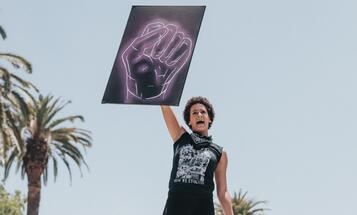
Black Women Overcoming Social Exclusion in Politics
Using this solutions-oriented, highly-resourceful way of thinking, black women have created a political strategy that confronts these dynamics head-on: relational organizing.
Immediately after the election the increasingly violent Trump administration continued to feed its most hateful impulses, making it evident that in spite of some progressive wins the fate of our country’s democracy hangs in the balance. Key to growing power is the voices of black women, and the Democratic Party has been forced to recognize their power—both as candidates and as voters.
The recent monumental victories of black women like Boston’s Ayanna Pressley and perhaps Georgia’s Stacey Abrams have created a wave of excitement and possibility within the Democratic Party. To achieve these wins, black women have utilized powerful organizing to energize the communities they serve and to triumph over social exclusion.
Decisions, policies and practices that shape the daily lives of black women continue to obstruct their civic engagement, yet black women overcome seemingly insurmountable institutional barriers to participate in the political process. Seven in 10 black women work hourly paid jobs, leaving them with little flexibility to reach the polls, let alone stand in long lines when they get there. Aggressive voter-roll purge policies also disproportionately restrict the voting rights of black women, as black households are more likely to lack current addresses because they have moved in the past two years, and likely against their will.
Black women who decide to run for public office must often navigate an obstacle course of anti-black policies and practices created to exclude them. Finding donors to support their candidacies is daunting, as black women have been barred from traditional pools of financial support. Wealthy donors who fund political campaigns are disproportionately rich, white and male. Consequently, they have very different views and priorities than African-American women, especially about how to structure our economy and how to prioritize the issues that matter most to black women.
The challenges of existing at the intersection of anti-black racism and sexism have made generations of black women experts at ‘making a way out of no way.’ Using this solutions-oriented, highly-resourceful way of thinking, black women have created a political strategy that confronts these dynamics head-on: relational organizing.
In a new Demos report, “Taking Our Seat at the Table: Black Women Overcoming Social Exclusion in Politics,” we examine how relational organizing can help push back on the myriad of ways black women are socially and structurally excluded from the political process. For example, not long ago, campaigners in Baltimore launched a campaign to raise the minimum wage by canvassing hair salons, a central locality for many black women in Baltimore. In hair salons, black women freely talk about family, community, and politics. Once organizers engaged patrons in conversation about their lives, and the economic issues that shape them, the women found common ground between the problems they faced and the campaign’s goals. Organizers who made clear the connection between lived experience and democracy reform were able to say, “Here’s how we build power in our communities.”
Pressley, Boston’s first black woman elected to City Council, shared on a panel about black women on organizing, voting and winning elections in 2018 that attention to relationships with people across social and economic strata was a critical component of building support for her campaign. The results of this work were striking: the median donation to her campaign was $64.00 and she received $1.00 donations from people experiencing homelessness. Further, 250 men in a Massachusetts correctional facility organized their families and friends to vote for Pressley. The lesson was simple: “If you show that you care about people, people will care about democracy.”
The onslaught of hate-filled policies coming out of the current administration has shown us that we need to strengthen the power in our communities, first and foremost by showing people that we care. The work of black women is a consistent reminder that, just as policies shape our day-to-day experiences, we must ground our political organizing in the realities of daily life. Voting not only reveals our relationship to our democracy—it also reveals our relationship to each other.
About the Authors
Charly Carter is a veteran political organizer and strategist, and the founder of Step Up Maryland and the Maryland Progressive Pipeline Project; and Carol Lautier, Ph.D., is a relational organizer and scholar, and Partnerships Manager of the Inclusive Democracy Project at Demos.



